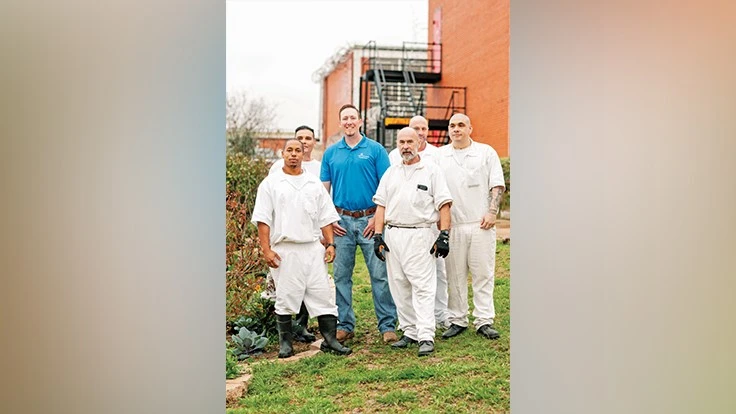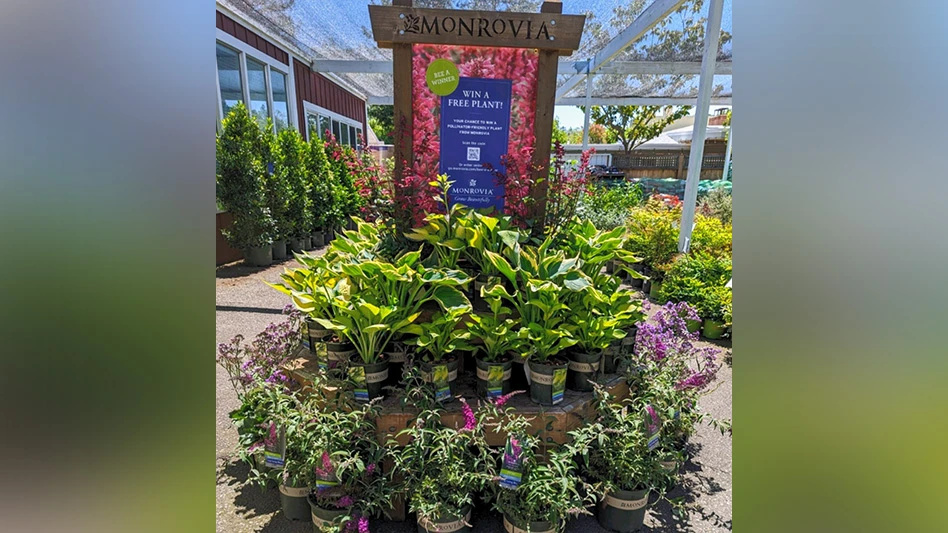
PHOTO: RYAN PRICE

There’s a stark contrast between James Langley’s garden and the chain-link fence surrounding it. Brick walls and barbed wire enclose the greenery, but the plants are lush year-round, sustained by the toasty Huntsville heat and the people who live behind those walls and wire at the Texas Department of Criminal Justice Ellis Unit.
Langley goes by Scooter, in part to differentiate himself from his father, James Langley Sr., who first started the prison horticulture program Scooter runs today. When it began, Lee College was simply trying to figure out which trades could most often lead to careers post-release. Langley Sr. initially became the horticulture instructor by pitching the school on the variety of different jobs an inmate could get after their release. From working in a nursery to lawn care, that diversity in opportunity stuck out to Lee College and Langley Sr. was hired.
For more than 40 years, the Langley family has taught landscaping techniques to incarcerated students. Inmates who agree to take Scooter’s classes are in a classroom or working in the field Monday through Friday for six hours at a time, earning certificates as horticulture technicians and in landscape management.
If they complete both — each one takes about six months of class and field work — students can enroll in further academics to earn an associate degree in science and horticulture or business through Lee College, which employs Langley and is still partnered with the prison facility today.
“It’s just like regular school. They’ve got to be there; they’ve got to do the assignments,” Langley says. “We have teachers that come in and teach the same curriculum, the same stuff that they do in the free world. It’s not a ‘give me’ kind of deal. They actually have to go to school.”
That education is not only therapeutic; it’s practical. Langley’s goal — and the goal of similar programs across the country — is to get these inmates a second chance at a career beyond prison walls.
A new life
After his release last May from the Noble Correctional Institution in Caldwell, Ohio, Charles Ellis decided he was going to start fresh.
With a close friend, Ellis started Backyard Detail, a two-man landscaping business. He had just completed three years in prison for his drug trafficking conviction, and says he wanted to take ownership and be proud of something he created. He was released before he completed his facility’s horticulture course, but he did receive his Ohio Nursery and Landscape Association certification.
Ellis also knew what type of uphill battle he faced after his release. He says some people will never get another opportunity at a career after serving their time in prison. Maybe they had one bad night or made one bad decision that cost them a lifetime’s worth of chances. This is another big reason why he took matters into his own hands and started Backyard Detail.
“To go to a job interview and when they ask you if you have a felony, to have to say yes and to sit there and explain and to hope that somebody could look past that, it was a big fear of mine,” Ellis says. “People make mistakes … but I would like to see jobs to actually look past that and see a person for who they are. Give them a chance.”
Robert Scott spent several years teaching horticulture and sustainability at a Midwest prison. Now, he’s the executive director of Cornell University’s Prison Education Program, which serves four prisons and roughly 200 incarcerated students.
Scott says reformed citizens who line up a job after their release are less likely to find themselves back in prison. Studying recidivism can be difficult because there are plenty of scenarios in iwhich someone is reincarcerated based on parole violations that aren’t technically crimes. However, Scott says nuanced analyses show these programs (not just in the horticulture field) are effective at landing good jobs and encouraging social behaviors compared to those in prison who don’t participate in an educational program.
And while Scott never guarantees potential employers that an employee will work out, he says many of them acknowledge their new opportunity and make the most of it.
“Who you were yesterday doesn’t determine who you will be today or tomorrow,” Scott says.

The second chance
Ohio Department of Rehabilitation and Corrections Administrator William Eleby works in the office of reentry and enterprise development, helping to connect inmates with jobs before their release. He organizes interviews and has inmates upload their resumes to a database that goes live up to 90 days before their last day in prison.
Eleby says only inmates who exhibit good behavior are allowed to participate in programs like the facilities’ horticulture classes.
He assesses whether a hiring company would be a good match for the person leaving prison. If, for instance, the company is located near a lot of bars and the student went to prison with an alcohol problem, Eleby’s going to advise against hiring that particular employee. He has also denied companies that don’t want previous offenders to really be a part of their team. If a company isn’t willing to give an employee from the program a legitimate chance at contributing something meaningful, Eleby may turn the company away.
“If you hire someone that is a restored citizen, then they’re restored,” Eleby says. “We don’t need you to say, ‘Well, we’re going to put them in a corner. We’re going to separate them from other employees.’ That’s not a good fit for us and I don’t think that’s the right company that we want to have an agreement with.”
While many business in the horticulture industry are having trouble finding reliable employees to hire, those that are connecting with prisons may be uncovering a worker who’s not going to complain about his or her work circumstances. ODRC horticulture instructor David Brennan, also a contractor with Brennan’s Plants in Athens County, Ohio, says his students will often do the physical labor that others aren’t willing to.
“We don’t mind getting cold, hot, dirty,” Brennan says. “Sadly, the percentage of the population that wants to do that is 10%, if that. As a contractor, we have a very limited pool we can draw on.”
Brennan also says many of his students will later be appreciative of the second chance, and Eleby says some feel particularly loyal to the companies that help provide them the opportunity to have a career after they leave prison. Ellis says it was gratifying to have his own company — and freedom — after his release.
“It was something to be taken away from your entire life and your entire world, to be able to come out of that and say, ‘I can do this for myself,’” Ellis says. “It means a lot. It made my life different.”
Good for the soul
These prison horticulture programs aren’t just about lining up jobs for convicts — they’re also about establishing the right path to recovery. The Insight Garden Program is largely based in California, and Executive Director Beth Waitkus has placed her program into several facilities on the West Coast , along with another in Indiana.
Insight Garden places an emphasis on the therapeutic element of the program, liberating the incarcerated by allowing them to design and nurture their own gardens. What’s most important to Waitkus is that her program’s students feel like they can take control of their own reformation and have a spot outside that allows them to express creativity and take pride in what they create. Their year-long curriculum covers environmental literacy in the first semester, then follows up with classes on permaculture gardening, leadership and reentering society.
“People learn to respond rather than react, which is often the reason some of these people end up incarcerated,” Waitkus says. “They may [be] under stress and not think of their consequences before they happen. This whole curriculum is woven together with the idea of mindfulness.”
The Insight Garden Program is less traditional than horticulture programs in most prisons. There’s not as much of a classroom as there is a circle in which students sit to hear facilitated discussions. Teachers ask students questions to see what they think rather than tell them what they need to know. They spend a lot of time meditating and mold their program on action-based learning, including art, skits and other presentations. The focus is on themselves, not their career.
“Gardening is the metaphor,” Waitkus says. “How do you garden yourself? How do you weed out the things that no longer serve you?”
But even for programs that are more traditional, the byproduct of learning about horticulture is treatment. Langley’s program in Texas is based on Christian ministry and emphasizes the importance of helping others in their therapeutic garden.
Scott mentions the profound importance of watching the incarcerated accept responsibility for their careers outside of prison.
And in Ohio, Brennan says working out in the field allows for restoration that can’t be taught in a classroom.
“Correction is the bars. Correction is the order,” Brennan says. “But [this is] rehabilitation. We are taking people who have the desire — who want the job — to go out, get a job and turn away from a life in prison.”

Getting involved
Eleby recommends that companies reach out directly to prison facilities if they’re interested in hiring who he calls “reformed citizens.” Employers should define what type of worker they’re seeking and what kinds of previous history would and would not be acceptable at their company. For example, some companies may be willing to take on somebody who went to prison for drug possession but not someone who was convicted of stealing from a past employer.
And for companies interested in aiding the programs by volunteering instruction or resources, Eleby says reaching out and asking questions about that facility’s specific horticulture programs will help. Often, it’s beneficial for both potential employers and inmates to connect while they’re still serving out their time in prison. Eleby says he also educates companies on how convictions work, which he hopes eliminates potential stereotypes. Still, he also recognizes that sometimes, it’s best for companies to meet potential employees firsthand
.Additionally, Eleby says he can’t guarantee one of his students will work out, but he advises each of them to not blow their second chance. Any slipups could cost not only themselves but others dearly.
“You don’t want a company or a business to have a bad taste in their mouth because of your selfishness,” Eleby tells students. “You’re representing every restored citizen and every offender regardless, because others will be judged based on their interactions or relationship with you.”
Langley says that in the 11 years he’s served as an instructor in the horticulture program, he’s heard from several former students who have gone on to establish better lives. Dozens have lined up jobs or started their own successful companies, and Langley says recidivism with the horticulture program is the lowest among other trade programs Lee College offers inmates. Maybe students saved up to buy a new house or car, or they earned promotions at the companies they started with after their release.
Those calls and success stories are the most rewarding part of the job, Langley says.
“A lot of these guys have never had an actual career, an actual full-time job,” Langley says. “That’s why they’re trying to find these trades that sound interesting to them, so that when they get out, they can better themselves, better their family, and give back to society.”

Explore the June 2019 Issue
Check out more from this issue and find your next story to read.
Latest from Garden Center
- This Florida garden center's busiest days are in the fall, not spring. Find out how they do it
- Terra Nova Nurseries releases new agastache variety, 'Peach Pearl'
- The Certified Shopify Online Garden Center provides local retailers with ecommerce tool
- Meet the All-America Selections AAS winners for 2025
- Endless Summer hydrangeas and Suntory Senetti glam up Grammys red carpet
- Ball Seed releases 2025 edition of 'Thrive and Flourish' for landscape and garden retail
- American Floral Endowment's Fred C. Gloeckner Foundation Research Fund accepting grant proposals
- Floral Marketing Fund and CalFlowers partner to advance floral industry





